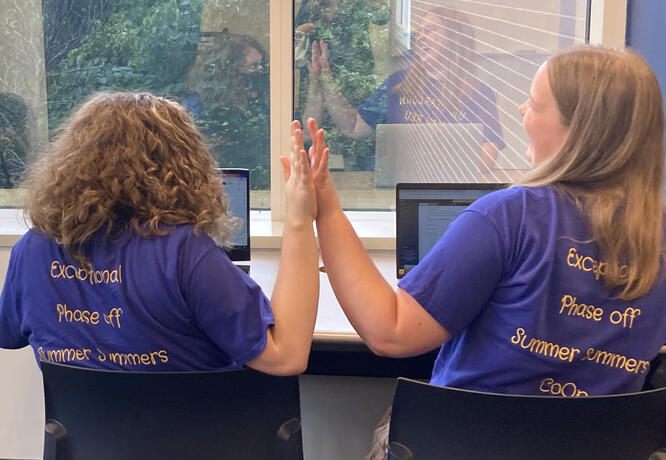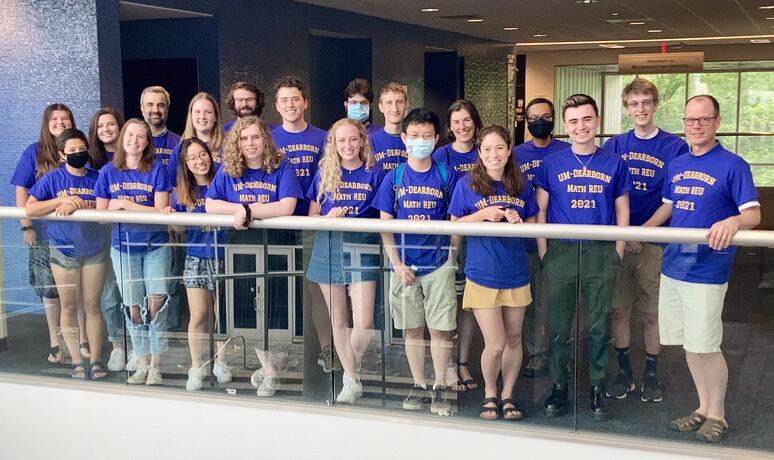
This article was originally published on July 19, 2021.
Mathematics major Timothy Batt, who will be a junior in the fall, had a series of firsts this summer. It was his first time in a campus classroom since the pandemic began. It was his first time conducting research. And it was the first time presenting his work at a national mathematics conference.
“It felt great to be back on campus and to collaborate with my peers and professors,” Batt said. “Not only did I feel productive, but I also felt engaged and comfortable working in-person.”
Batt took part in the National Science Foundation-sponsored Research Experience for Undergraduates (REU) in Mathematics on the UM-Dearborn campus. Mathematics Associate Professor Yunus Zeytuncu said the prestigious REU program has less than 50 sites across the country and is extremely competitive. “With us hosting a site, Dearborn students have an opportunity to take part in an REU on their campus each summer.”

The REU teams — there were five groups each working on a separate complex mathematics problem — bonded over math research and sightseeing.
They traveled to Greenfield Village, ate dinner together at Buddy’s Pizza, spent time walking around campus and gathered in downtown Dearborn cafes.
Batt said his team started the day by grabbing coffee before heading to the Math and Statistics Library on the second floor of the CASL Building, where they’d stay and work on their research until 4 or 5 p.m.
Batt said his group studied the numerical range and spectrum of a composition operator in the infinite-dimensional Hardy space induced by an anti-diagonal matrix. Which, according to Batt, is as complicated as it sounds. And while many areas of mathematics have application to the real world, the one his group worked on was a bit more abstract — but he said today’s research can lead to future application.
“I think about (mathematician and logician) George Boole and how he created the system of Boolean Logic, the foundation for computer operations, about 100 years before there was an application. His work was seen as impractical at the time. But then research caught up to his work and what was once seen as not having any application changed the way we live,” Batt said. “Sometimes problems are answered before we know where the solutions will take us.”

Each student admitted to the REU program received a stipend, room and board and an expanded professional network of mentors and peers. During the week, five groups met with guest speakers and worked closely with UM-Dearborn Mathematics faculty like John Clifford, Kelly Jabbusch, Yulia Hristova, Aditya Viswanathan, Tian An Wong and Zeytuncu.
“Every math professor that I’ve had at UM-Dearborn in my classes has been fantastic and getting to know professors as a research student was a great experience too,” Batt said. “I’ve heard stories from friends at other colleges about the bad math professor and I keep waiting, but I’ve never had anything like that.”
During the last day of the program, each student group took part in a mathematics conference, where they had an opportunity to present their work; they also spent time with guest speakers talking about the graduate school admissions process.
Batt said students interested in mathematics and considering a graduate degree in the subject should apply — it gave him insight into the research process and what goes into a successful Ph.D. application.
“UM-Dearborn professors offer highly regarded opportunities like these, but in a way that doesn’t feel out of reach. If you have an interest in mathematics, apply for next year’s program. I was nervous because I haven't done math research before. But I quickly learned that there wasn’t any reason to be nervous — everyone was nice and they know you are there to learn,” Batt said. “I met great people and had a lot of fun being back on campus and working with everyone.”
Story and photos by Sarah Tuxbury. For more information about the REU program, contact Yunus Zeytuncu.



